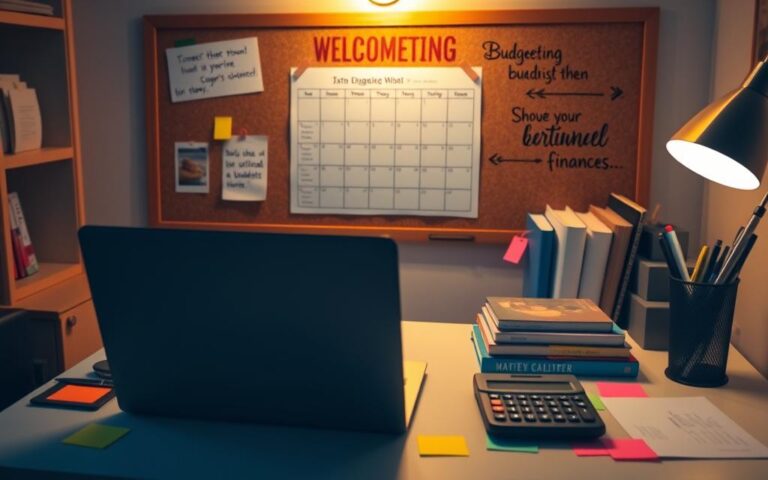Advertisement
Did you know about 30% of Americans have no budget? This leaves them open to money troubles. Weekly budgeting helps newbies understand their spending and saving better. It’s crucial for financial health.
Good budgeting can guide beginners through daily costs and prep them for future wins. With smart planning and the right tools, anyone can make a budget that fits their goals.
Understanding the Importance of a Weekly Budget
Budgeting for millennials is crucial in today’s quick financial world. A weekly budget helps track money over a week. This way, people can focus on what they spend short-term. It makes dealing with money easier and friendlier.
What is a Weekly Budget?
A weekly budget plans your spending and saving every week. It keeps track of regular money coming in and out. This simplicity lets people quickly see their financial habits. So, they make smarter choices.
Benefits of Weekly Budgeting
Weekly budgeting comes with many perks. It improves how you see your spending habits. You see where to cut or change. It also allows for setting and sticking to short-term financial goals. For many millennials, this method boosts their confidence in money management.
Common Budgeting Myths
Some myths make budgeting seem hard or limiting. But, it can be easy and give power to millennials. A week-by-week plan often makes it simpler to follow a budget. It helps build good money habits. And it encourages a positive way to handle finances.

Setting Up Your First Weekly Budget
Creating a weekly budget starts by looking at your income. Knowing where your money comes from is key. Next, figure out your total income. Then, split your expenses into fixed and variable categories. This is vital for making a good plan.
Assessing Your Income Sources
Your income might come from different places. Common sources include:
- Salary from employment
- Freelance or side job earnings
- Investments or rental income
After finding these sources, write down how much they add up to. This gives you a solid starting point for your budget.
Identifying Fixed and Variable Expenses
It’s easier to budget when you know your fixed and variable expenses. Fixed expenses don’t change month to month. Variable expenses, however, can go up or down. Check out these examples:
| Expense Type | Examples |
|---|---|
| Fixed Expenses | Rent, mortgage, insurance, loan payments |
| Variable Expenses | Groceries, dining out, entertainment, shopping |
Knowing these expense types helps you use your income wisely in your budget.
Using Budgeting Tools and Apps
Using apps and tools can really improve how you manage your money. Popular ones like Weekly and Mint are easy to use. They help you keep an eye on your spending and savings. With these tools, it’s simpler to stick to your budget plans.

Determining Your Financial Goals
Having clear financial goals is key to good budgeting. By knowing your aims, managing your money each week gets easier. Long and short-term goals give you a clear plan for your money journey. Getting advice on financial planning can make reaching your goals smoother, improving your money skills.
Short-Term Financial Goals
Short-term goals are what you hope to do in less than a year. Examples are saving for a holiday, starting an emergency fund, or paying off small debts. These goals give you quick wins and help you feel good as you meet them. You can make saving plans that fit your week or month, helping you see your success. Using beginner saving tips helps you reach your aims without hurting your budget.
Long-Term Financial Goals
Long-term goals last more than a year and include big plans like retirement savings, buying a house, or paying for college. Choosing these goals means thinking about the life and money you want in the future. Adjusting your budget to match your dreams helps you spend wisely each week. Keeping your eyes on these big goals helps you save consistently, leading you to financial freedom.
Creating Your Spending Categories
Having clear spending categories is key for smart budgeting. It lets you split your expenses into what’s necessary and what’s not. This way, you can plan your finances better to fit how you live. Sorting your spending helps track where every dollar goes. It also lays a base for adjusting your budget as needed.
Essential vs. Non-Essential Expenses
Essential expenses are what you must spend money on. This includes housing, utilities, food, and getting around. They’re important for keeping up your life quality. Non-essential expenses, however, are extras. Things like eating out, fun activities, and luxury buys fall into this category. Cutting back on these can make more room for the essentials.
Allocating Funds for Savings and Debt Repayment
A good budget focuses on saving money and paying off debt. Set aside part of your income just for savings to secure your future. Also, make sure you’re paying down debts, like loans or credit cards. A budget that highlights saving and reducing debt promotes healthy financial practices. It also helps achieve your financial goals in the long run.
Tracking Your Expenses Effectively
Keeping an eye on your spending is key to managing your money well. There are several ways to get a clear picture of your expenses. This includes using apps, spreadsheets, or the classic pen and paper. Using a method you stick with helps you understand your financial status better.
Methods for Tracking Expenses
Different methods exist for efficiently tracking your expenses. Here are a few popular ones:
- Expense Tracking Apps: Apps like Mint and YNAB make it easy with their simple interfaces and instant updates.
- Spreadsheets: With spreadsheets, you can get very detailed in organizing and analyzing what you spend.
- Pen and Paper: For some, there’s nothing like the hands-on experience of jotting down expenses every day.
How to Adjust Your Budget Midweek
Making adjustments to your budget during the week is important. If you’re spending too much in some areas, here’s what you can do:
- Look at what you’ve spent so far compared to your weekly budget plan.
- Find out where and why you’re going over budget. This helps you understand what needs changing.
- Move some money from less important areas to keep on track with your financial goals.
Tips for Sticking to Your Budget
To achieve financial health, stick to your budgeting goals. Effective strategies help you stay on track and think positively about money. Good money habits can lead to success in the long run. By practicing regularly, budgeting can easily become part of your daily life.
Building Healthy Financial Habits
Start by being mindful of how you spend and reviewing your budget often. This builds responsibility. Developing these habits will guide your choices and keep you focused on your goals. This dedication makes it easier to spend wisely and save money.
Creating a Reward System
A reward system can motivate you to follow your budget. When you reach your goals, treat yourself. This makes budgeting feel more rewarding and builds a positive money mindset. Adding rewards turns managing money into something to look forward to, not a task.
Adjusting Your Budget as Needed
Starting a budget is just the first step to managing money well. It’s vital to know when to change your budget to keep it working. Life often throws surprises that call for changes in how we plan our finances. By being open to changes, you can avoid stress and stay confident about your budget.
Recognizing When to Revise Your Budget
There are signs that it’s time to update your budget. A change in income, up or down, means you need to think over your financial plan again. Events like losing your job or new family duties might make budget adjustments necessary. Keep an eye out for these signs and be ready to update your financial plan to stay stable.
Tips for Handling Unexpected Expenses
Unexpected costs can mess up the best financial plans. Here are some ways to lessen their impact:
- Create a Buffer: Save a little bit of your income each month for surprise expenses.
- Prioritize Flexibility: Make sure your budget has space for changes when unexpected costs happen.
- Assess Financial Goals: Look at your goals now and then to see if you need to make temporary changes.
Planning for surprises can make your budget better, so you’re ready for anything without wrecking your financial goals.
Understanding the Role of Emergency Funds
An emergency fund is key to staying financially stable. It’s your safety net for unexpected situations. If you have one, you won’t stress as much when facing difficulties. People start an emergency fund to handle surprises without using credit cards or loans. Avoiding more debt is crucial. Saving little by little is a smart way to build this fund safely.
Why You Need an Emergency Fund
Creating an emergency fund is crucial for many reasons. It gives you peace of mind knowing you’re ready for anything. If you face a medical issue, car trouble, or lose your job, this fund helps. You can face these problems without taking on new debt.
How to Start an Emergency Fund
Begin your emergency fund by saving a little at a time. Start small, then save more when you can. Here’s how to do it effectively:
- Determine your target amount: Save enough to cover three to six months of living expenses.
- Open a separate savings account: Keeping this fund separate from other spending is wise.
- Set up automatic transfers: Moving a part of your income into savings regularly will build your fund.
Following these steps will help your emergency fund grow. Having this backup is key during uncertain times.
| Emergency Fund Goal | Monthly Savings Needed | Time to Reach Goal |
|---|---|---|
| $1,500 | $125 | 12 months |
| $3,000 | $250 | 12 months |
| $5,000 | $417 | 12 months |
Reviewing and Analyzing Your Budget Monthly
Checking your budget every month is key to staying financially healthy. It helps you see how you spend and make money. This lets you spot trends, find ways to get better, and make smarter budget plans. Good financial advice can improve your spending habits.
Benefits of Regular Budget Reviews
Looking at your budget every month has many benefits:
- Identification of Spending Trends: Watching how your spending changes helps you know where to make corrections.
- Accountability: Frequent checks help you stick to your financial goals and cut down on extra spending.
- Improved Financial Awareness: Understanding your expenses leads to smarter choices in money management ahead.
- Adaptability: You can change your budget when your income changes or unexpected costs come up.
Tools for Budget Analysis
Different tools make analyzing your budget easier:
- Budgeting Apps: Tools like Mint or YNAB (You Need a Budget) make it easy to watch your money.
- Spreadsheet Software: Google Sheets or Microsoft Excel let you create a budget that fits your needs exactly.
- Financial Software: Programs like Quicken have advanced features for deep budgeting and seeing your financial health.
Resources for Continued Budgeting Success
To keep your budgeting on track and make your finances healthier, consider using various budgeting apps and tools. Apps like Mint and You Need a Budget (YNAB) help you monitor spending and create budgets that fit your needs. They make it easy to see where you stand financially.
Choosing the right budgeting app can simplify managing your money. It can also make decision-making clearer and more efficient.
Recommended Budgeting Apps and Tools
Choosing the right budgeting apps and tools is essential. Look for ones that match your financial situation. There are many options besides Mint and YNAB, such as PocketGuard and EveryDollar. Each has unique features suited for different needs.
These apps do more than help organize your finances. They also offer advice on financial planning to better your budgeting methods. Using these tools can make your budgeting journey smoother and set you up for success in the future.
Books and Blogs on Personal Finance
Reading books and blogs about personal finance is also helpful. Works like “The Total Money Makeover” by Dave Ramsey and The Budget Mom blog offer useful tips on managing money and budgeting. They can provide you with new insights and strategies.
Reading these regularly helps you learn more about financial planning. This knowledge is key to making smart choices and maintaining good financial habits. Using these resources can improve your budgeting abilities and help you meet your financial goals.



